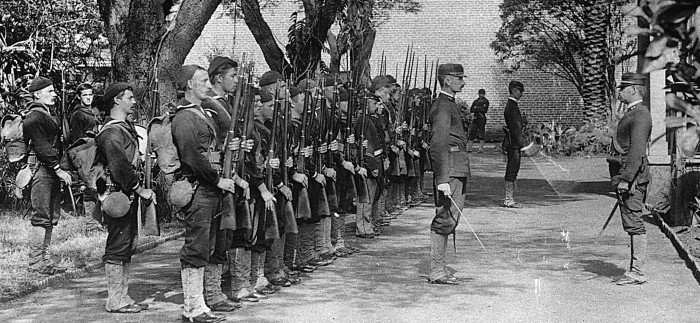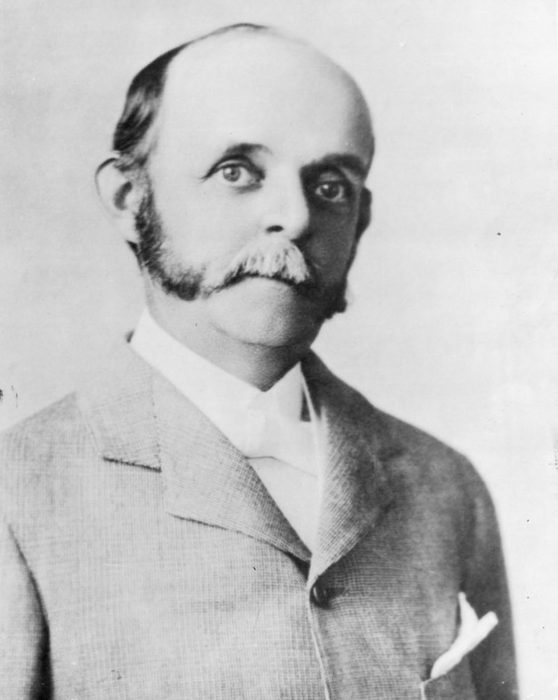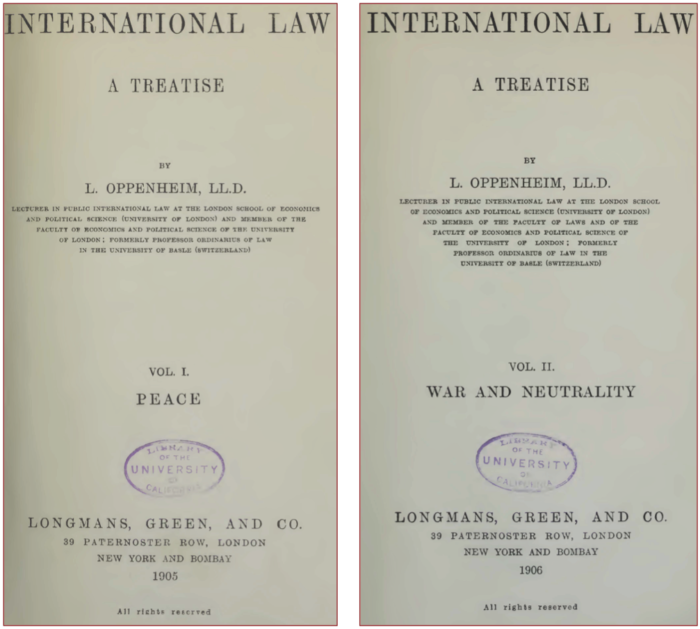
Today marks 125 years of an Unjust War waged against the Hawaiian Kingdom by the United States of America. This profound and fundamental fact has been obscured through a deliberate and relentless barrage of denationalization by the United States.
 This process, which is known as Americanization and which is a war crime, has nearly obliterated the national consciousness of the Hawaiian Kingdom in the minds of Hawai‘i’s people, and by extension, the international community. Samuel Damon, an insurrectionist and traitor to Hawai‘i, stated in 1895, “If we are ever to have peace and annexation the first thing to do is to obliterate the past.” Damon also served as Trustee for the Kamehameha Schools from 1884-1909.
This process, which is known as Americanization and which is a war crime, has nearly obliterated the national consciousness of the Hawaiian Kingdom in the minds of Hawai‘i’s people, and by extension, the international community. Samuel Damon, an insurrectionist and traitor to Hawai‘i, stated in 1895, “If we are ever to have peace and annexation the first thing to do is to obliterate the past.” Damon also served as Trustee for the Kamehameha Schools from 1884-1909.
The key to understanding the prolonged and unjust war between the Hawaiian Kingdom and the United States is to begin with the legal status of the Hawaiian Kingdom under international law. Since war, whether just or unjust, is regulated by international law, the Hawaiian Kingdom would need to have been an independent State prior to the American invasion on January 16, 1893. As an independent State it would have been a subject of international law, and, therefore, international law would be the lens through which to interpret the invasion as well as determining whether or not an unjust war was triggered.
The Hawaiian Kingdom as an Independent State
In 2001, the Permanent Court of Arbitration’s arbitral tribunal, in Larsen v. Hawaiian Kingdom, declared “in the nineteenth century the Hawaiian Kingdom existed as an independent State recognized as such by the United States of America, the United Kingdom and various other States, including by exchanges of diplomatic or consular representatives and the conclusion of treaties.” The terms State and Country are synonymous.
As an independent State, the Hawaiian Kingdom entered into extensive treaty relations with a variety of States establishing diplomatic relations and trade agreements. The Hawaiian Kingdom entered into three treaties with the United States: 1849 Treaty of Friendship, Commerce and Navigation; 1875 Commercial Treaty of Reciprocity; and 1883 Convention Concerning the Exchange of Money Orders. In 1893 there were only 44 independent and sovereign States, which included the Hawaiian Kingdom, as compared to 197 today.
On January 1, 1882, it joined the Universal Postal Union. Founded in 1874, the UPU was a forerunner of the United Nations as an organization of member States. Today the UPU is presently a specialized agency of the United Nations.
By 1893, the Hawaiian Kingdom maintained over ninety Legations and Consulates throughout the world. In the United States of America, the Hawaiian Kingdom manned a diplomatic post called a legation in Washington, D.C., which served in the same function as an embassy today, and consulates in the cities of New York, San Francisco, Philadelphia, San Diego, Boston, Portland, Port Townsend and Seattle. The United States manned a legation in Honolulu, and consulates in the cities of Honolulu, Hilo, Kahului and Mahukona.
“Traditional international law was based upon a rigid distinction between the state of peace and the state of war (p. 45),” says Judge Greenwood in his article “Scope of Application of Humanitarian Law” in The Handbook of the International Law of Military Occupations (2nd ed., 2008), “Countries were either in a state of peace or a state of war; there was no intermediate state (Id.).” This is also reflected by the fact that the renowned jurist of international law, Professor Lassa Oppenheim, separated his treatise on International Law into two volumes, Vol. I—Peace, and Vol. II—War and Neutrality.

Presidential Investigation of the Overthrow of the Hawaiian Government
On January 16, 1893, United States troops invaded the Hawaiian Kingdom without just cause, which led to a conditional surrender by the Hawaiian Kingdom’s executive monarch, Her Majesty Queen Lili‘uokalani, the following day. Her conditional surrender read:
“I, Liliuokalani, by the grace of God and under the constitution of the Hawaiian Kingdom, Queen, do hereby solemnly protest against any and all acts done against myself and the constitutional Government of the Hawaiian Kingdom by certain persons claiming to have established a provisional government of and for this Kingdom.
That I yield to the superior force of the United States of America, whose minister plenipotentiary, His Excellency John L. Stevens, has caused United States troops to be landed at Honolulu and declared that he would support the said provisional government.
Now, to avoid any collision of armed forces and perhaps the loss of life, I do, under this protest, and impelled by said force, yield my authority until such time as the Government of the United States shall, upon the facts being presented to it, undo the action of its representatives and reinstate me in the authority which I claim as the constitutional sovereign of the Hawaiian Islands.”
In response to the Queen’s conditional surrender of her authority, President Grover Cleveland initiated an investigation on March 11, 1893, with the appointment of Special Commissioner James Blount whose duty was to “investigate and fully report to the President all the facts [he] can learn respecting the condition of affairs in the Hawaiian Islands, the causes of the revolution by which the Queen’s Government was overthrown, the sentiment of the people toward existing authority, and, in general, all that can fully enlighten the President touching the subjects of [his] mission (p. 1185).” After arriving in the Hawaiian Islands, he began his investigation on April 1, and by July 17, the fact-finding investigation was complete with a final report. Secretary of State Walter Gresham was receiving periodic reports from Special Commissioner Blount and was preparing a final report to the President.
On October 18, 1893, Secretary of State Gresham reported to the President, the “Provisional Government was established by the action of the American minister and the presence of the troops landed from the Boston, and its continued existence is due to the belief of the Hawaiians that if they made an effort to overthrow it, they would encounter the armed forces of the United States.” He further stated that the “Government of Hawaii surrendered its authority under a threat of war, until such time only as the Government of the United States, upon the facts being presented to it, should reinstate the constitutional sovereign, and the Provisional Government was created ‘to exist until terms of union with the United States of America have been negotiated and agreed upon (p. 462).’” Gresham then concluded, “Should not the great wrong done to a feeble but independent State by an abuse of the authority of the United States be undone by restoring the legitimate government? Anything short of that will not, I respectfully submit, satisfy the demands of justice (p. 463).”
Investigation Concludes United States Committed Acts of War against the Hawaiian Kingdom
One month later, on December 18, 1893, the President proclaimed by manifesto, in a message to the United States Congress, the circumstances for committing acts of war against the Hawaiian Kingdom that transformed a state of peace to a state of war on January 16, 1893. Black’s Law Dictionary defines a war manifesto as a “formal declaration, promulgated…by the executive authority of a state or nation, proclaiming its reasons and motives for…war.” And according to Professor Oppenheim in his seminal publication, International Law, vol. 2 (1906), a “war manifesto may…follow…the actual commencement of war through a hostile act of force (p. 104).”
Addressing the unauthorized landing of United States troops in the capital city of the Hawaiian Kingdom, President Cleveland stated, “on the 16th day of January, 1893, between four and five o’clock in the afternoon, a detachment of marines from the United States steamer Boston, with two pieces of artillery, landed at Honolulu. The men, upwards of 160 in all, were supplied with double cartridge belts filled with ammunition and with haversacks and canteens, and were accompanied by a hospital corps with stretchers and medical supplies (p. 451).”
President Cleveland ascertained that this “military demonstration upon the soil of Honolulu was of itself an act of war, unless made either with the consent of the Government of Hawaii or for the bona fide purpose of protecting the imperiled lives and property of citizens of the United States. But there is no pretense of any such consent on the part of the Government of the Queen, which at that time was undisputed and was both the de facto and the de jure government. In point of fact the existing government instead of requesting the presence of an armed force protested against it (p. 451).” He then stated, “a candid and thorough examination of the facts will force the conviction that the provisional government owes its existence to an armed invasion by the United States (p. 454).”
“War begins,” says Professor Wright in his article “Changes in the Conception of War,” American Journal of International Law, vol. 18 (1924), “when any state of the world manifests its intention to make war by some overt act, which may take the form of an act of war (p. 758).” According to Professor Hall in his book International Law (4th ed., 1895), the “date of the commencement of a war can be perfectly defined by the first act of hostility (p. 391).”
The President also determined that when “our Minister recognized the provisional government the only basis upon which it rested was the fact that the Committee of Safety had in the manner above stated declared it to exist. It was neither a government de facto nor de jure (p. 453).” He unequivocally referred to members of the so-called Provisional Government as insurgents, whereby he stated, and “if the Queen could have dealt with the insurgents alone her course would have been plain and the result unmistakable. But the United States had allied itself with her enemies, had recognized them as the true Government of Hawaii, and had put her and her adherents in the position of opposition against lawful authority. She knew that she could not withstand the power of the United States, but she believed that she might safely trust to its justice.” He then concluded that by “an act of war, committed with the participation of a diplomatic representative of the United States and without authority of Congress, the Government of a feeble but friendly and confiding people has been overthrown (p. 456).”
“Act of hostility unless it be done in the urgency of self-preservation or by way of reprisals,” according to Hall, “is in itself a full declaration of intent [to wage war] (p. 391).” According to Professor Wright in his article “When does War Exist,” American Journal of International Law, vol. 26(2) (1932), “the moment legal war begins…statutes of limitation cease to operate (p. 363).” He also states that war “in the legal sense means a period of time during which the extraordinary laws of war and neutrality have superseded the normal law of peace in the relations of states (Id.).”
Unbeknownst to the President at the time he delivered his message to the Congress, a settlement, through executive mediation, was reached between the Queen and United States Minister Albert Willis in Honolulu. The agreement of restoration, however, was never implemented. Nevertheless, President Cleveland’s manifesto was a political determination under international law of the existence of a state of war, of which there is no treaty of peace. More importantly, the President’s manifesto is paramount and serves as actual notice to all States of the conduct and course of action of the United States. These actions led to the unlawful overthrow of the government of an independent and sovereign State. When the United States commits acts of hostilities, the President, says Associate Justice Sutherland in his book Constitutional Power and World Affairs (1919), “possesses sole authority, and is charged with sole responsibility, and Congress is excluded from any direct interference (p. 75).”
According to Representative Marshall, before he became Chief Justice of the U.S. Supreme Court, in his speech in the House of Representatives in 1800, the “president is the sole organ of the nation in its external relations, and its sole representative with foreign nations. Of consequence, the demand of a foreign nation can only be made of him (Annals of Congress, vol. 10, p. 613).” Professor Wright in his book The Control of American Foreign Relations (1922), goes further and explains that foreign States “have accepted the President’s interpretation of the responsibilities [under international law] as the voice of the nation and the United States has acquiesced (p. 25).”
Despite the unprecedented prolonged nature of the illegal occupation of the Hawaiian Kingdom by the United States, the Hawaiian State, as a subject of international law, is afforded all the protection that international law provides. “Belligerent occupation,” concludes Judge Crawford in his book The Creation of States in International Law (2nd ed., 2006), “does not affect the continuity of the State, even where there exists no government claiming to represent the occupied State (p. 34).” Without a treaty of peace, the laws of war and neutrality would continue to apply.

Why doesn’t the local news tell the whole story? They always brag that they are journalists who tell the truth. But from what I’m seeing in the news they tell a watered-down version of the facts of the illegal overthrow of the Hawaiian Kingdom and never talk about the illegal occupation of the Hawaiian Kingdom by the United States.
This is very good!! How can people support this action??
E kala mai au. He ninau.
How can the denationalization of Hawaiians be called “Americanization” when the true American National is being denationalized and genocided by the exact same entities and processes as the Hawaiian?
I was horrified to find out the true story behind the U.S. illegal takeover, can’t believe they outlawed the Hawaiian language and dances, etc.!!! Hawaiians should know that people on the mainland have no idea. The cover up is global!!!
Denationalization means to erase ones national consciousness. Americanization means to turn all aspects of something American.
Aloha Christian, the U.S. denationalized the Hawaiians of their national consciousness by getting rid of Hawaiian nationalism and replacing it with American nationalism. They turned all aspects of nationalism American. Hence, the term Americanization. Every thing Hawaiian was now American. Pretty straight forward.
When are the ICI Fact Finding hearings going to take place?
Being a descendant of Hawaiian nationals, I wasn’t told the true status of my kupuna’s
and the Hawaiian kingdom’s International status. Therefore Americanization was thought through a controlled environment through american education.
Question… anyone know if Hawaii is/was a member to the Inter-Parliamentary Union? I get confused w/the postal union. Mahalo in advance!! (Web links or citations if possible ?)
do you have any write up’s about all the different “groups” i.e. LHG, the office in Hilo that charges for HK ID/driver’s license/ plates just to name a few????
these groups are part of the problem for so many people who are confused because indoctrination then they “buy into” it….
This is for the blog master or those in charge of posting updates on this blog, it’s been nearly four months since the last post. The term, no news is good news, is always good, but some news or conversation keeps the interest going and the continued education of all who follow this blog. I understand that you may be busy, but please think about posting educational information to keep the conversation going until there are updates regarding the Hawaiian Kingdom. Mahalo
Yes, four months is quite a while to ponder regarding the realization of the ICI Hearings…especially when Dr. Sai has discovered/uncovered that the US Cabal corruption runs high & deep. The US Deep State & The UN Deep State are just two pals covering for each other?
4 Months
Fantastic research and overview, mahalo!